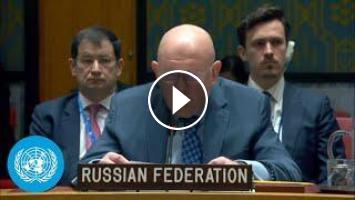The mandate renewal of the panel of experts assisting the sanctions committee on Democratic People's Republic of Korea (DPRK) was vetoed today (28 Mar) by permanent Council member Russia, in a vote of 13 favour to 1 against (Russia) and 1 abstention (China).
Addressing the Council before the vote, Vasily Nebenzya, Russian Permanent Representative to the United Nations, said, “We are witnessing an unprecedented policy from a coalition of Western countries led by the USA to strangle Pyongyang, which includes harsh unilateral restrictions, aggressive propaganda, and direct personal threats against the DPRK authorities. Taken together, all of these measures call into question the very possibility of resolving problems underpinning in the future.”
After the vote, Robert A. Wood, US Deputy Permanent Representative to the United Nations, commented, “Today's vote will only embolden the DPRK to act with further impunity. The DPRK jeopardizes global security through the development of long-range ballistic missiles and sanctions evasion efforts.”
Hwang Joon Kook, Permanent Representative of the Republic of Korea to the United Nations, stated, “This is outrageous, and it makes no sense at all given the continued and accelerated advancement of the North Korean nuclear and missile programs. Pyongyang has been openly denouncing the authority of the Security Council and pursuing an increasingly dangerous and aggressive nuclear policy, in particular targeting the Republic of Korea. At this moment, Russia seems to be more interested in embracing while encouraging the DPRK for its provision of munitions and ballistic missiles for the conduct of war in Ukraine.”
Geng Shuang, Chinese Deputy Permanent Representative to the United Nations, said, “The current situation on the peninsula is characterized by persistent tensions and growing confrontation, which serves no one's interest. This is the last thing China wants to see. The settlement of the Peninsula issue cannot be divorced from political mutual trust and a favorable climate. Blindly increasing sanctions and highlighting pressure will not help resolve issues, it will only be counterproductive. Indulging in military alliances and obsession with the military confrontation will only further exacerbate antagonism and tensions, making the goal of denuclearizing the peninsula and maintaining its peace and stability even more elusive.”
Talking after the Security Council in her national capacity, Pascale Baeriswyl, Permanent Representative of Switzerland to the United Nations, said, “The panel of experts independently and transparently documents the implementation of sanctions. Due to the veto exercise today, the panel will not be able to continue its important work, including in documenting apparent violations of the sanction’s regime in place. This further increases the suspicions around current and future violations.”
Addressing the Council before the vote, Vasily Nebenzya, Russian Permanent Representative to the United Nations, said, “We are witnessing an unprecedented policy from a coalition of Western countries led by the USA to strangle Pyongyang, which includes harsh unilateral restrictions, aggressive propaganda, and direct personal threats against the DPRK authorities. Taken together, all of these measures call into question the very possibility of resolving problems underpinning in the future.”
After the vote, Robert A. Wood, US Deputy Permanent Representative to the United Nations, commented, “Today's vote will only embolden the DPRK to act with further impunity. The DPRK jeopardizes global security through the development of long-range ballistic missiles and sanctions evasion efforts.”
Hwang Joon Kook, Permanent Representative of the Republic of Korea to the United Nations, stated, “This is outrageous, and it makes no sense at all given the continued and accelerated advancement of the North Korean nuclear and missile programs. Pyongyang has been openly denouncing the authority of the Security Council and pursuing an increasingly dangerous and aggressive nuclear policy, in particular targeting the Republic of Korea. At this moment, Russia seems to be more interested in embracing while encouraging the DPRK for its provision of munitions and ballistic missiles for the conduct of war in Ukraine.”
Geng Shuang, Chinese Deputy Permanent Representative to the United Nations, said, “The current situation on the peninsula is characterized by persistent tensions and growing confrontation, which serves no one's interest. This is the last thing China wants to see. The settlement of the Peninsula issue cannot be divorced from political mutual trust and a favorable climate. Blindly increasing sanctions and highlighting pressure will not help resolve issues, it will only be counterproductive. Indulging in military alliances and obsession with the military confrontation will only further exacerbate antagonism and tensions, making the goal of denuclearizing the peninsula and maintaining its peace and stability even more elusive.”
Talking after the Security Council in her national capacity, Pascale Baeriswyl, Permanent Representative of Switzerland to the United Nations, said, “The panel of experts independently and transparently documents the implementation of sanctions. Due to the veto exercise today, the panel will not be able to continue its important work, including in documenting apparent violations of the sanction’s regime in place. This further increases the suspicions around current and future violations.”
- Category
- United Nations
- Tags
- UN, United Nations, UNGA
Be the first to comment













